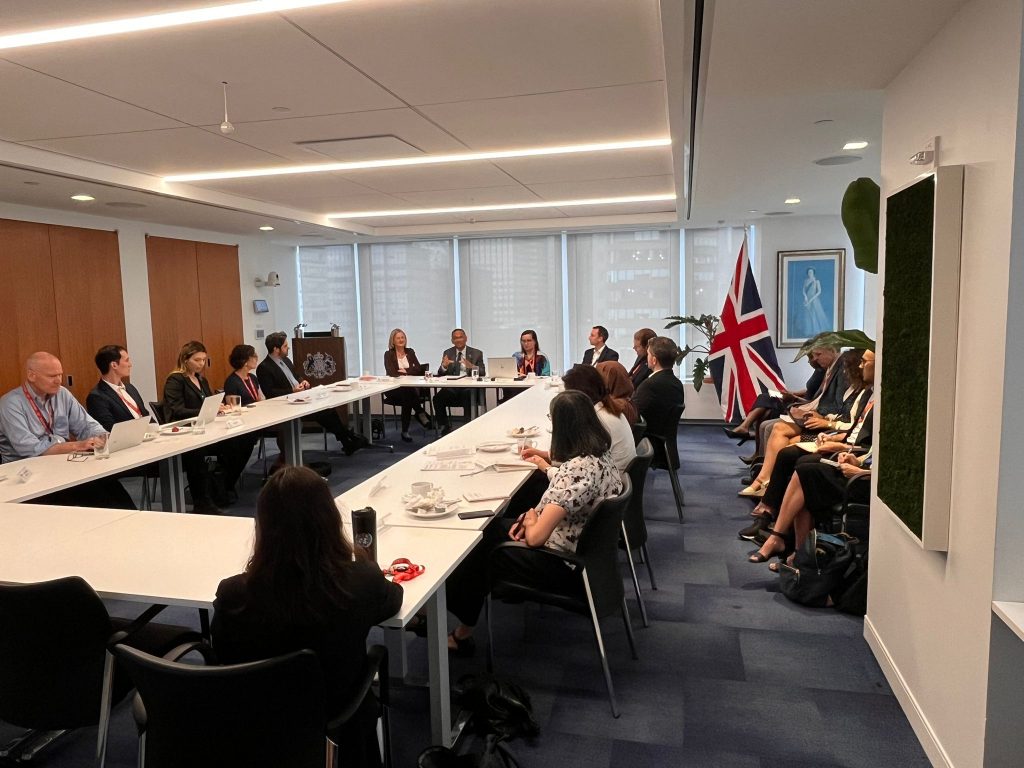
Against the backdrop of the UN High Level Political Forum and the looming end to negotiations of the Declaration on Future Generations, SOIF and the Future of Climate Cooperation co-hosted a roundtable event in New York, focusing on “Long-Term Governance and Future Generations: Innovations in Implementing the SDGs”, hosted by the UK Mission to the UN.
This gathering brought together representatives from UN member states, including the co-facilitators of the Declaration on Future Generations, officials, politicians, and practitioners from various countries, all eager to discuss and explore tangible examples of long-term governance happening around the world to show how the Declaration of Future Generations can be implemented on a country level.
The roundtable set up another opportunity for the Summit of the Future Programme team to bridge the gap between the different layers of government, both domestically and internationally, to support early adopters in creating a route to innovations and reforms that lead to long-term governance and a high-ambition Summit of the Future.
The key question was clear: How can we bring the concept of making decisions for future generations out of the ‘abstract’ and into reality?
Domestic Innovation for Endless Possibilities
Participants’ interventions showcased the innovations already occurring, and as a result, demonstrated what is possible when action is partnered with ambition for current and future generations:
Senator Olekina Ledama from Kenya brought attention to the pressing issue of intergenerational fairness within his country. He shared insights into the innovative measures emerging from the Kenya Senate Futures Caucus, including the development of an intergenerational fairness assessment tool designed to ensure a peaceful and equitable future for all Kenyans. Senator Olekina’s contribution underscored the importance of addressing intergenerational issues through concrete policy tools and frameworks.
Jake Sherman, Minister Counselor, UN Management and Reform from the US Mission to the UN highlighted the successes of various US cities and states in implementing the SDGs through a long-term resilience approach. He emphasised the significance of localising foresight capabilities and integrating long-term planning into local governance. Sherman’s presentation showcased the potential of grassroots initiatives to drive meaningful progress toward achieving the SDGs.
Gustavo Westmann, Special Advisor for International Affairs and G20 lead at the Presidency of the Republic of Brazil, highlighted the essential connection between long-term thinking, intergenerational debt, and finance for development. His insights emphasised the need for financial strategies that account for the well-being of future generations, ensuring that development efforts are sustainable and equitable.
TD Marc Ó Cathasaigh from Ireland provided an inspiring example of how the country is incorporating long-term governance into its budgetary cycle and committee structures to support the implementation of the SDGs. He championed Ireland’s well-being framework, which prioritises the holistic well-being of its citizens. However, O’Cathasaigh also noted a crucial gap in Ireland’s approach: the absence of a Future Generations Commissioner. Such a role would be instrumental in championing, challenging, and safeguarding the interests of future generations, ensuring that their voices are represented in today’s policy decisions.
The Case for a Future Generations Envoy
TD Ó Cathasaigh’s intervention prompted a wider discussion about the importance of a central leadership figure at the multilateral level, reflecting the negotiations in the Declaration on Future Generations on the possibility of the Secretary General appointing a Special Envoy for Future Generations. While some had concerns over the cost of an Envoy, others warned that without the accountability and support role, implementation of the wider declaration would be under threat.
Discussions led to a thread of common themes of what is required to move forward for successful implementation – a coordination of efforts across nations with a clear focal leadership, the resources necessary for effective work and a unified framework for consistency at different levels of governance.
A huge thank you to Ambassador Young and the UK Mission to the UN for kindly hosting the event.
